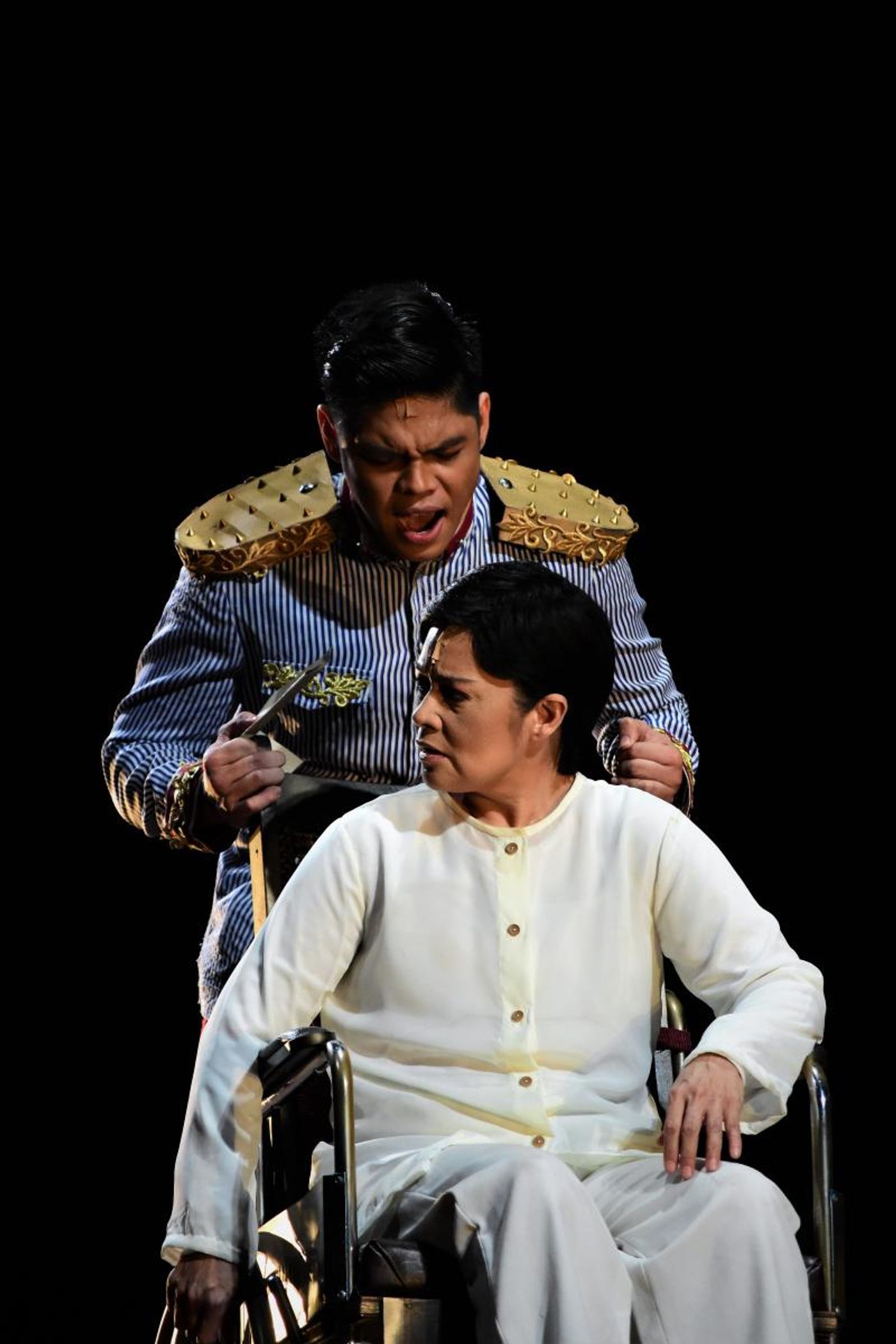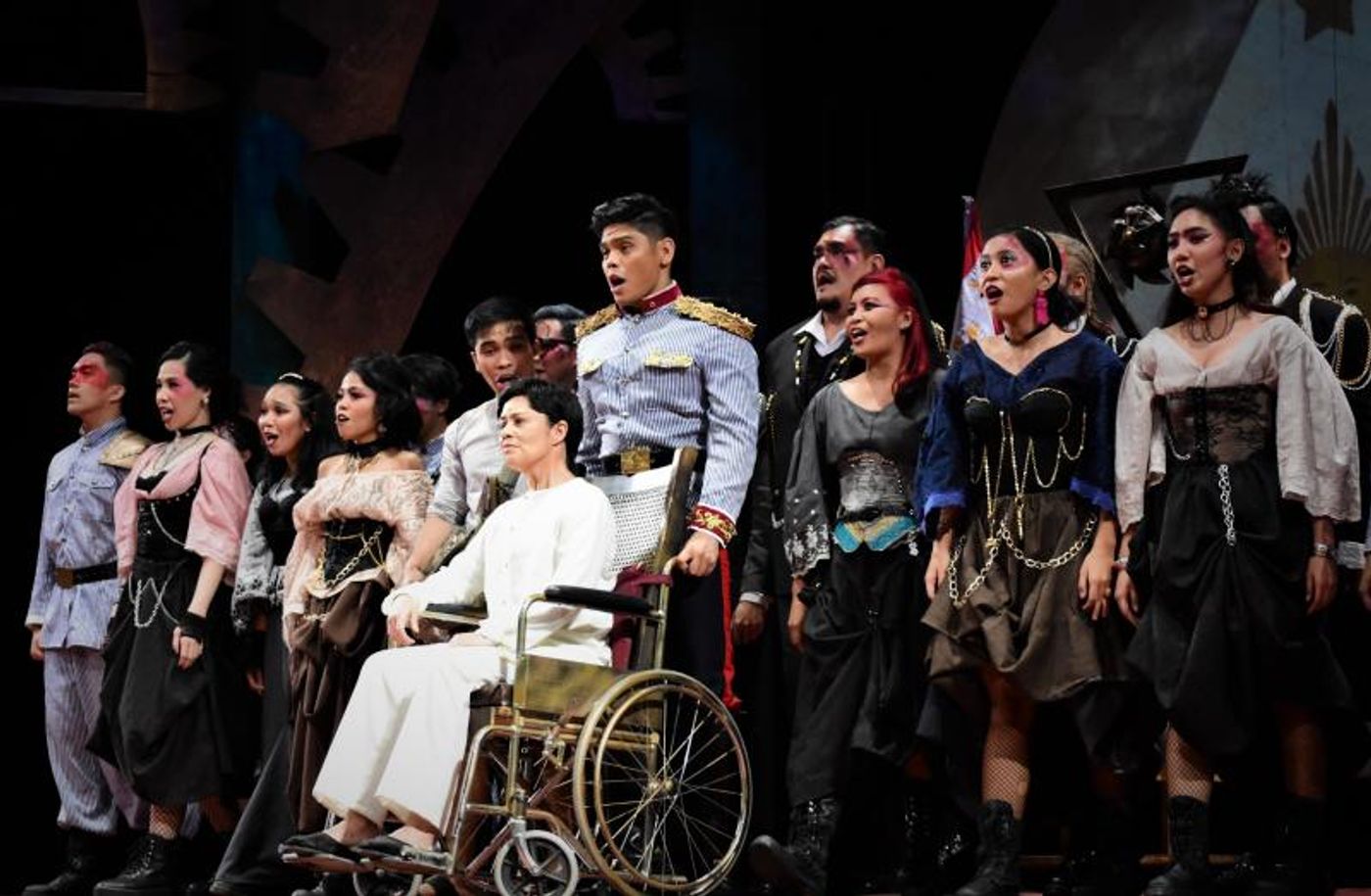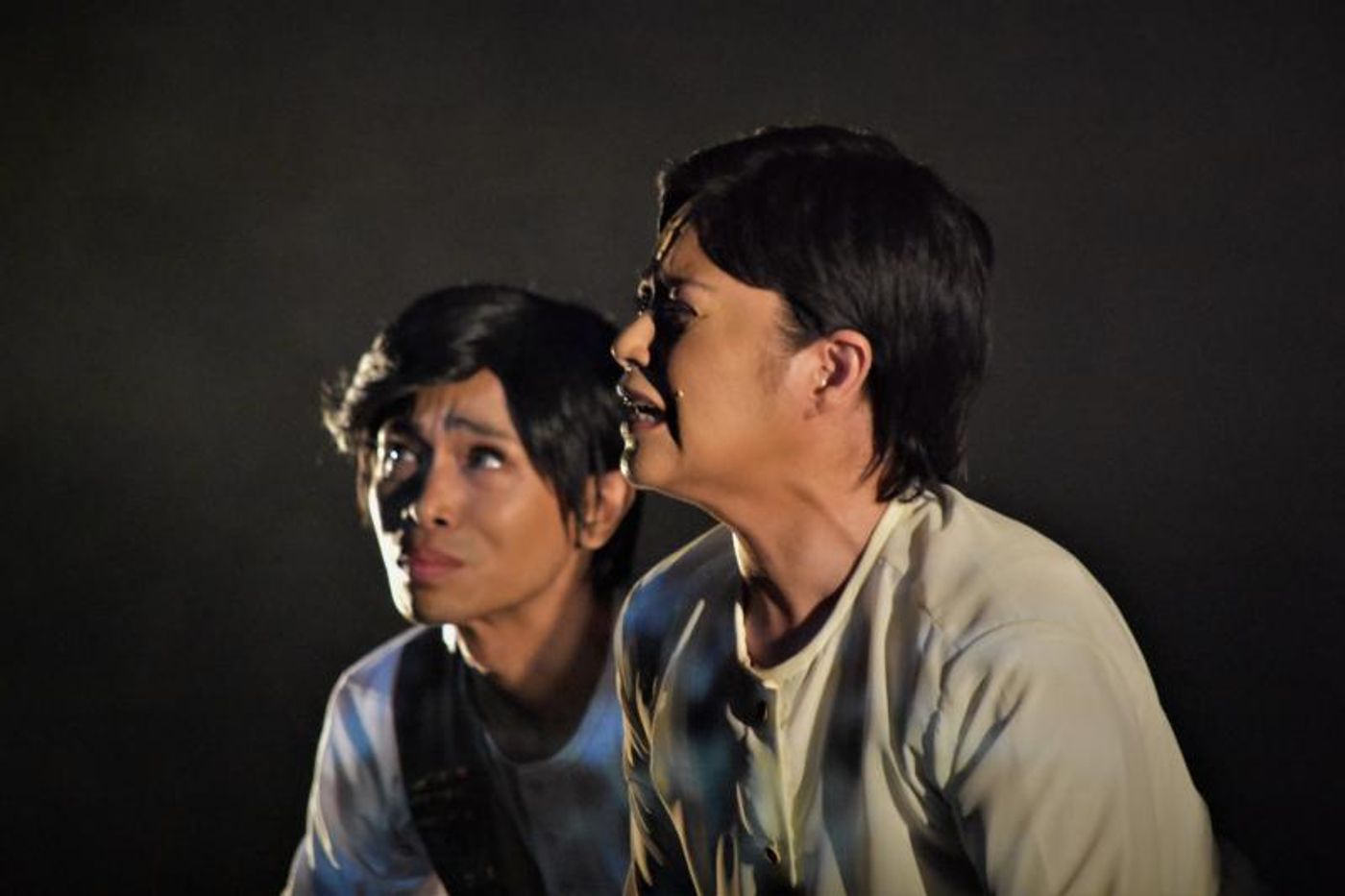MABINING MANDIRIGMA: Philippine Hero's Story Begs to be Heard Amidst Confusion
Learn More About MABINING MANDIRIGMA
 Aesthetics is said to be the science of beautiful in its myriad manifestations--be it sublime, comic, tragic, pathetic, whimsical, or ugly.
Aesthetics is said to be the science of beautiful in its myriad manifestations--be it sublime, comic, tragic, pathetic, whimsical, or ugly.
MABINING MANDIRIGMA (Gentle Warrior), Tanghalang Pilipino's original Filipino musical on Philippine hero Apolinario Mabini (1864-1903), legal and constitutional adviser to the Revolutionary Government in 1898 and the first Prime Minister of the Philippines upon the establishment of the First Philippine Republic in 1899, ambitiously presents these various aesthetic facets on one overwhelming platter. It's innovative, as the production claims. And it's steampunk, too.
It's easy to admire ambitious productions: they give innovation a platform to sprout, grow, and blossom. That way, artists remain dynamic--always looking for new ways, new meanings, and new purpose. Furthermore, to a veteran or newbie audience, ambition could simply mean a potentially exciting and intriguing approach at something that may have been seen and viewed in the same light for years.
But ambition solely does not a musical make; its vision must be its clear end--a product of cohesive means. It's also important that the audience shares in this vision. And this is where many musical productions falter.
A Platter of Clashing Elements
MANDIRIGMA attempts to meld a hodgepodge of clashing elements in an almost two-hour retelling of the story of one of the least talked about Philippine heroes, Apolinario Mabini. History has labeled Mabini in quite an ironic way--"the sublime paralytic"--back when political correctness was not even a concept. The word "mabini" connotes effeminate undertones, making the musical title itself a major and intriguing antithetical premise.
The choice to cast Monique Wilson in the gender-crossing lead pushes this premise to an indomitable political statement against any form of gender bias. It does help that Wilson is the Global Director of One Billion Rising, the global movement to end violence against women and children, and an active member of Gabriela, a local leftist advocacy group on women issues. On a wider perspective, the musical becomes a megaphone against an administration that prides itself in a bloody drug war, and whose leader continues to offend women with his unapologetic misogynistic theatrics.
 Nicanor Tiongson's libretto is strong and focused on what it wants to tell: Mabini's physical disability, his enviable resolve and intellect, and his faultless love for his country and loyalty to Gen. Emilio Aguinaldo, the Philippines' first president. To someone who does not know the hero, his triumphs and struggles as the "Brain of the Philippine Revolution" against the Americans then become easy to follow and relate to. It helps that Mabini's romantic trysts and wanderings, if there were any, are left out. Easily, Tiongson's book is one of the strongest elements of the show.
Nicanor Tiongson's libretto is strong and focused on what it wants to tell: Mabini's physical disability, his enviable resolve and intellect, and his faultless love for his country and loyalty to Gen. Emilio Aguinaldo, the Philippines' first president. To someone who does not know the hero, his triumphs and struggles as the "Brain of the Philippine Revolution" against the Americans then become easy to follow and relate to. It helps that Mabini's romantic trysts and wanderings, if there were any, are left out. Easily, Tiongson's book is one of the strongest elements of the show.
Pushing the innovation envelope further, Chris Millado's direction adopts a foreign theme--steampunk--infused rather shamelessly into the sets, costumes, and makeup. Millado's attempt to adopt this foreign element could have made this production a statement to reckon with, but somehow somewhere, something doesn't connect. The gumption to inject the steampunk theme impresses a dystopian flair but that's all there is to it--no justifiable connection to the whole, as it merely looks like a whimsical approach at impressing an innovative flair onto a material that would have been better off given a straightforward or a more cohesive interpretation.
Joed Balsamo's score seems to sing its own contribution to the ambition. An important element in storytelling, the score does not show any hint of what steampunk really is, and at most, seems to stand on its own, thereby throwing out its purported marriage to Ms. Steampunk out of the stage door. With a couple of interesting songs, the score, however, is mostly recitative-sounding and lacking in that "millennial vibe" that the creative team is so in want of, to hook the new generation of potential theater enthusiasts. MANDIRIGMA, needless to say, is in dire need of memorable tunes that could haunt these millennials, or anyone else, when they leave the dark theater behind. That key emotional experience courtesy of a song or two that audiences easily connect to is, sadly, unsung.
 On the other hand, Toym Imao's installed and projected sets jibe with steampunk flair all right, but they also seem to move and tick themselves away on their own. For instance, the installed gigantic shifting gears succeed in dwarfing the actors and stealing the limelight from them. And with that clock, plus those gears, one cannot help but shoo away any green wicked thought that distracts them from the complete enjoyment of something original. The choice to project important historical snippets on centerstage screen does help move the story forward, sans the tedious rhetoric that would have bogged down the narrative.
On the other hand, Toym Imao's installed and projected sets jibe with steampunk flair all right, but they also seem to move and tick themselves away on their own. For instance, the installed gigantic shifting gears succeed in dwarfing the actors and stealing the limelight from them. And with that clock, plus those gears, one cannot help but shoo away any green wicked thought that distracts them from the complete enjoyment of something original. The choice to project important historical snippets on centerstage screen does help move the story forward, sans the tedious rhetoric that would have bogged down the narrative.
Denisa Reyes's choreography is also not completely blameless. One may have seen similar choreographic attempts using the ensemble to highlight major scenes in, say, Dulaang UP's "The Dressing Room" (2018), or the controversial "M Butterfly" (2019). But these productions have made use of kurogo movements to direct the audience's lens to a major character or scenario unfolding on stage. Some sporadic movements, needless to say, prove to be distracting rather than helpful. The strength of Reyes's choreography could be seen in the epilogue --a scene that summarizes Millado's vision, and quite a moving closure to boot.
To top it all, the flagrant attempt at wooing the millennials with an ensemble that jump suits--from anime (Dragon Ball Z Pule against the Charon trio) to machete-wielding ninjas, from demonic apparitions to silly ilustrados--constantly distract the viewer's attention from Wilson, who defiantly and admirably steers the musical to its vision.
A Force to Reckon with, and then Some
Amidst all the confusing elements that pockmark the musical, Wilson is a breeze. Trained mostly in English, one may awe at her clarity in the Filipino language. To an inexperienced actor, playing the part of the disabled hero can be an impediment--his/her movements mostly confined to a wheelchair. To a seasoned actor like Wilson, MANDIRIGMA is an opportunity to turn this impediment into her strength. Her character mostly immobile, she steers her fire and soul into the very wheelchair that limits her, which then becomes her wheels to a clear portrayal. Agitated, she thrashes the wheels in frenetic compulsion; in her most still, she paddles it like a canoe on a silken sea. Wilson, together with Tiongson, is the bolts and gears that hold this musical together, which is always in constant threat of disintegrating. Hers is one portrayal that demands attention, empathy, and a standing O.
 Wilson also has some great help in Phi Palmos and Paw Castillo, who both help the audience focus on the essentials. Castillo's Pepe (Mabini's aide and adopted son) and Palmos's Pule (the young Mabini) provide some light moments that the musical is in desperate need of.
Wilson also has some great help in Phi Palmos and Paw Castillo, who both help the audience focus on the essentials. Castillo's Pepe (Mabini's aide and adopted son) and Palmos's Pule (the young Mabini) provide some light moments that the musical is in desperate need of.
Arman Ferrer's Emilio Aguinaldo may be a well-written character, and in Wilson's and Ferrer's characters, Belsamo's score does find its clear voice. However, while Wilson sings her Mabini to a solid in-depth portrayal, Ferrer chooses to perform his in a beautiful tenor. This is good, except for the fact that Ferrer's portrayal of the conflicted Philippine president is rather superficial, at most, cardboardish. In his musical numbers with Wilson, Ferrer's saving grace is that remarkable tenor voice, which, thankfully, demands equal attention all on its own.
The Verdict: MABINING MANDIRIGMA may have its share of flaws, but it's one story that rises above today's chaos and dares to confront the ugly in its best attempt possible.
Photos: Oliver Oliveros

Videos

